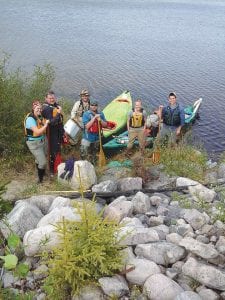Beginning mid-June the six-person team of (left to right) Tessa Olson, Alex Compton, Adam Maxwell, Ryan Ritter, Kari Smerud, and Jake Bendel paddled/portaged 907 miles on nine river systems north to the Hudson Bay community of Whales Cove, arriving there on August 11. Maxwell, Bendel and Olson are all former employees of Voyageur Canoe Outfitters.

Towards the end someone always stayed awake, a loaded 12-gauge shotgun nearby, on polar bear watch. The far-flung travelers also set up three motion sensing sirens around their campsite to ensure spotting any large white furry intruder before it came too close.
Polar bears are the alpha hunters in Hudson Bay, and people are on the menu if you let them make you a delicacy.
But after 56 days of paddling and portaging 907 miles into the Canadian tundra the six-person crew of Tessa Olson, Ryan Ritter, Kari Smerud, Jake Bendel, Alex Compton and Adam Maxwell most decidedly didn’t want to end up as polar bear snacks.
“I got a call from Adam this morning [August 11] by satellite phone. He said, ‘All is well, all are good,’” said Scott Maxwell, Adam’s relieved father.
The crew had arrived at Hudson Bay that morning but needed to get a boat ride across the large windblown bay to Whale Cove, Nunavut, an Inuit village of 353 people where they intended to end their trip. Before leaving they were going to either sell, barter, or give away the three canoes they used on this trip because it is too expensive to haul them back to Duluth.
The 8 Rivers North Expedition left Duluth mid June and drove 18 hours to northern Saskatchewan where they slipped their canoes into the Waterfound River. From Waterfound they paddled/portaged into the Fond du Lac, Chipman, Dubawant, Kamilukak, Nowley, Kazan, Ferguson and Wilson rivers. All in all that makes nine rivers, but one river (the Kamilukak) was added to the route after the website and their “8 Rivers North” name were announced.
All told they paddled/ portaged 494 hours, crossed (about) 61 portages, and dipped their paddles into the water 2,646,720 times.
Along the way the crew saw a herd of 2,000 caribou, a herd of about 40 muskox, wolverines and yes, at about 400 yards away, a polar bear, but he didn’t seem interested in them.
They also paddled a lot of white water but were careful and portaged around sections of rivers that were too rough. Even with satellite radio and spot locators, injury in the deep wilderness can be devastating and help a long way off, so they did the best they could to mitigate danger and injury.
The crew is made up of several college students and recent college graduates that met at UMD or at summer camps. Adam Maxwell, Jake Bendel and Tessa Olson are former employees of Voyageur Canoe Outfitters.
They began their journey traveling waterways surrounded by bugs and boreal forest but by the end they crossed into tundra where trees disappeared like the memory of a good home cooked meal and the bugs were fewer. They carried food and gear—18 backpacks loaded with 1,500 pounds of mostly food— taking enough for a 66-day trip, but most of it required no cooking. They ate a lot of oatmeal, summer sausage, peanut butter, sunflower seeds, dehydrated apples, beef jerky, wild rice, cheese energy bars.
As their backpacks got lighter, they also got lighter.
Coming home will also be something of an adventure. First they will take a 90-minute flight to Churchill, a 47-hour train ride on the “muskeg express” to Winnipeg and then travel 8 hours by car to Duluth.
With strong feelings about the outdoors and educations geared towards outdoor recreation, teaching, and the environmental sciences, the crew wants to use this trip to show nature at its most rugged and wild state.
“We want to educate people about wilderness and the importance of preserving it, and to inspire more young people to paddle,” said Maxwell, who to date has taken three long canoe trips into the Canadian back country.


Loading Comments